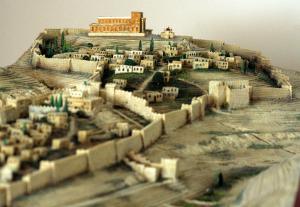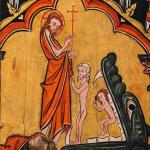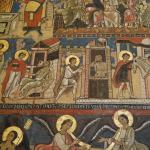
Solomon’s Temple, built to house the presence of God, provides us ways to understand various aspects of our relationship with God through the symbolism used in its construction. But, as the Temple was built before the incarnation, its symbolism could only hint at what would be revealed to us in Jesus Christ. That is, we must not expect every aspect of revelation to find itself represented in the symbols employed in the Temple. And, we must also keep in mind, while its symbols were important, we must not get distracted by them and forget the primary purpose of the Temple, which was to make a place for God in the world, a place where we could approach God, interact with God, and even make our thoughts and desires known to God. It also was a place in which the glory of God was to be encountered, because God’s glory will always be found in the presence of God. Thus, the Temple was a place where we could worship God, opening ourselves up to the majesty and glory of God and all that God is willing to give us if we but make room for it in our lives. And yet, in the midst of all of this, we also find that the presence of God was, as it were, surrounded by a darkness which we could not penetrate:
Then Solomon said, “The LORD has set the sun in the heavens, but has said that he would dwell in thick darkness. I have built thee an exalted house, a place for thee to dwell in for ever.” (1 Kings 8:12-13 RSV).
As the house of God, God’s presence was truly encountered in the Temple, though of course, we must not understand that as indicating that God could be and was bound to one place. Rather, the presence of God, a manifestation of God’s activity in the world, was found there, allowing those who came to it to learn about God and God’s greater glory. The darkness in which God’s glory was (and is) found demonstrates that there is always more to God than what our perceptions are able to perceive. God always transcends our apprehensions: “Clouds and thick darkness are round about him; righteousness and justice are the foundation of his throne” (Ps. 97:2 RSV).
The Jewish tradition also highlighted the oneness of God in such a way to remind us of God’s sheer transcendence to anything human. When we try to take our apprehensions of God and absolutize them, we end up with idolatry. Thus, representing the presence of God as being surrounded by darkness cuts off all attempts to imagine and misrepresent God’s transcendent nature. Nonetheless, it must be made clear, this is all symbolic; in another sense, God is said to be light, not darkness: God is light and in him is no darkness at all” (1 Jn. 1:5b RSV). This is why even the darkness must not be absolutized, making us think there is something of God which is not of the light.
What surrounds God is described as darkness, but in reality, it is really another kind of light, a light which is so bright that it overrides us and our ability to apprehend, let alone comprehend, God, making it seem as if we have come into some sort of darkness when we find ourselves next to it. God is the “unapproachable light” (cf. 1 Tim 6:16) who shines in glory; we can receive the light, but not in its fullness.
The more we apprehend the light of God, the more we will be transformed by it, but also, the more we will realize how much God is beyond us, and how much, therefore, God dwells in a bright darkness beyond our perceptions in the so-called “cloud of unknowing.” To apprehend more, we must cast aside what we think we know, realizing the words and ideas we have are all human conventions with all the limitations of such conventions. We must not hold on to them as if they are absolutes. Rather, through them, we are pointed to the absolute which transcends them. When we cast them aside, we must do so following their lead, going to where they point us to go to instead of just dismissing them and going in the opposite direction.
After our encounter with the divine glory, and having become adjusted to what we have apprehended, we will find what we have obtained is wonderful. We will want more of it. That is, the divine glory will attract us, and through such attraction, we will seek to apprehend more and more of it. If we follow where it leads us, we will be constantly moving to greater and greater heights of glory, in a never-ending journey from glory to glory. We will apprehend more and more of God, being transformed by every apprehension, while come to know and realize even better each time how great God is because we will understand even more the transcendence of God:
His nature cannot be grasped because it lacks space, time, measure and anything else we can apprehend; instead, our mind is overcome with dizziness and stumbles all over the place because it cannot lay hold of transcendent reality. Being powerless, it returns to its connatural state. Our minds love to know only about God’s transcendence of which they are persuaded because his nature differs from anything we know. [1]
We are not called to comprehend the truth, but to participate in it, that is, to dwell in it, even as we are to let it dwell in us. But, as we do so, we will realize, it is not meant just for us alone; it is something which we are meant to share with everyone:
Truth resides in itself, eternally, infinitely, perfectly; it cannot be the private property, prerequisite, or privilege of anybody. A human being can only know truth by participation in that infinite perfection, and that is why the intellect has to renounce its limiting personalism, must “seek not her own.” There is no ownership of truth, what is mine is everybody’s, all participate in it. [2]
While our conventions, our private appropriation of truth, must always give way to the greater truth, we can and should share what we have apprehended to others with the conventions we have made for them. We must do so in a way to remind everyone of the caveat which lies behind all such conventions, the same caveat which was expressed in the way God’s presence was shrouded by darkness in the Temple. Then, when we do that, we can help others share in the glory which we have experienced, even as they will then be able to share with us that element of the glory of God they experienced with their own encounter with God. For, the truth, and the glory of God, is not some sort of private property, something for us to seize for ourselves; it is, rather, something which God intends to be shared, and in that sharing, bring everyone together as one.
[1] St. Gregory of Nyssa, Homilies on Ecclesiastes. Trans. Richard McCambly. Ed. John Litteral (Ashland, KY: Litteral’s Christian Library Publications, 2014), 70 [Homily 7].
[2] Vladimir Solovyey, God, Man & The Church. The Spiritual Foundations Of Life. Trans. Donald Attwater (Cambridge: James Clarke & Co., 2016), 26.
Stay in touch! Like A Little Bit of Nothing on Facebook.
If you liked what you read, please consider sharing it with your friends and family!
N.B.: While I read comments to moderate them, I rarely respond to them. If I don’t respond to your comment directly, don’t assume I am unthankful for it. I appreciate it. But I want readers to feel free to ask questions, and hopefully, dialogue with each other. I have shared what I wanted to say, though some responses will get a brief reply by me, or, if I find it interesting and something I can engage fully, as the foundation for another post. I have had many posts inspired or improved upon thanks to my readers.













